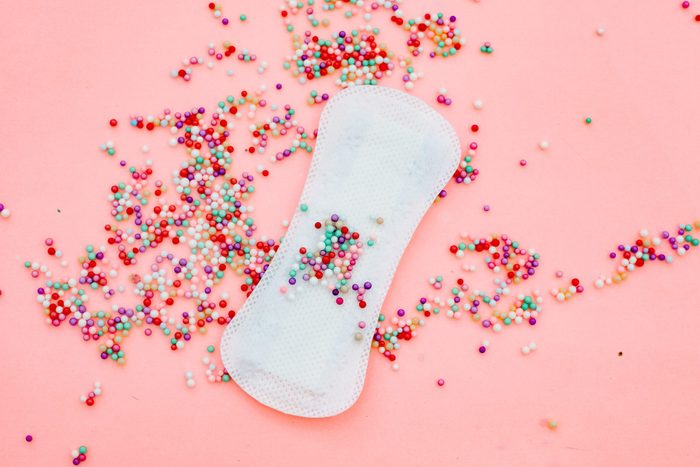
Night sweats? Check. Hot flashes? Check. Weird periods? Double check. All of these symptoms were expected during her perimenopause transition, says Samantha Simmons, 60, of Louisville, Colorado. (She’s not alone: 85% of women say they experienced disruptive signs of menopause, according to research published in the American Journal of Medicine.) But there was one menopause symptom that totally blind-sided her.
“The most surprising thing was how blue I felt. Literally, like I felt hopeless,” she says. “I had no idea it was linked to menopause, and it was scary trying to figure out what was happening to me. I’ve always been a pretty positive person, and I wish someone had warned me about the massive tidal wave of sadness.”
Mood changes are just one of the frustrating and surprising symptoms that can be caused by the hormone changes during perimenopause—the decade-ish leading up to menopause, says Emily Hu, MD, OB/GYN, a clinical professor at University of California San Francisco. (Fun fact: Menopause isn’t something you “go through”, it’s an event, specifically the day marking 12 months after your final period.)
Signs of Seasonal Depression? 7 Simple Strategies to Help You Feel Better
During this period, estrogen, progesterone, and testosterone all drop dramatically, affecting everything from your skin to your sex drive. The hormone changes can also increase a woman’s risk for certain illnesses, like heart disease, diabetes, and some cancers.
“Considering we all have to go through it, women need so much more education about this transition. We should all be talking early and often about what to expect from the hormonal changes as we age and the way they affect every system in the body,” says Dr. Hu, a certified menopause practitioner who specializes in doing exactly that. “And know that we have ways to help you; this isn’t something you just have to suffer through!”
To help you navigate this tricky—and sometimes exciting!—time in your life, Dr. Hu shares with The Healthy @Reader’s Digest what signs of menopause to expect from head to toe.

Brain fog
Cognitive problems, including brain fog and forgetfulness, are common during the perimenopausal transition. “We’re not sure how much of this is due to hormones and how much is due to the aging process of the brain but we do see this symptom more often in women than men so female hormones likely play a part,” says Dr. Hu.
Estrogen is neuroprotective in the brain so as estrogen declines around menopause, the brain becomes more vulnerable to cognitive decline, according to a 2021 review of existing scientific literature, published in World Journal of Psychiatry.
Over 40? Here Are 9 Clever Memory Exercises to Start Doing Today

Mood disturbances and mental illness
Dr. Hu says it’s a myth that menopausal women are raging psychos—and one that pop culture really needs to stop perpetuating as it can make women worry they are “crazy.”
However, our hormones are tightly linked to our moods and it’s very common to have mood swings, even things like the extreme sadness Simmons experienced. Perimenopausal women are also at a higher risk for depression and anxiety disorders, Dr. Hu adds.
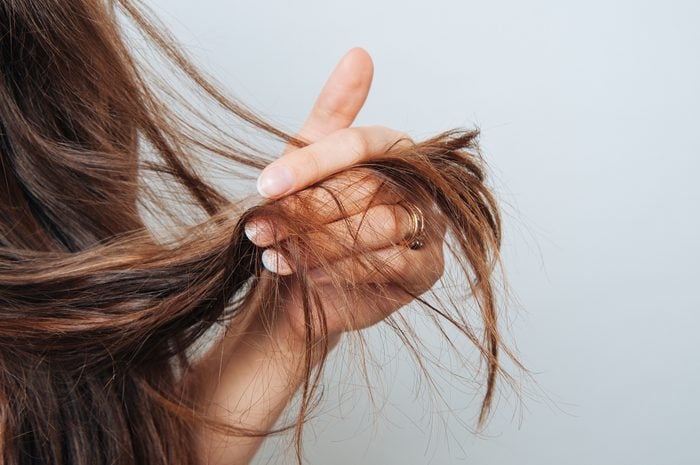
Hair changes in texture, fullness, and length
Increased female hormones are associated with thicker, fuller, shinier hair (hence why many pregnant women have such glorious manes). Unfortunately, as they drop, your hair can drop with it.
Many women report thinning hair and slower growth are signs of menopause, and nearly half of women will experience female patterned hair loss. You may also notice a change in texture, perhaps getting curlier or straighter, or becoming wiry as you get more gray, says Dr. Hu.

Dry, sagging skin on your face and hands
Estrogen is linked to the production of collagen, the protein that gives your skin youthful elasticity and fullness. So as estrogen drops, so does the skin on your face. Less estrogen also may lead to skin that is drier, less elastic, and more prone to static wrinkles. However, all of this is a normal part of aging—for both sexes—and shouldn’t be seen as a flaw, notes Dr. Hu.
Dermatologists Say This 1970s Anti-Aging Ingredient Is Still the Gold Standard for Gorgeous Skin
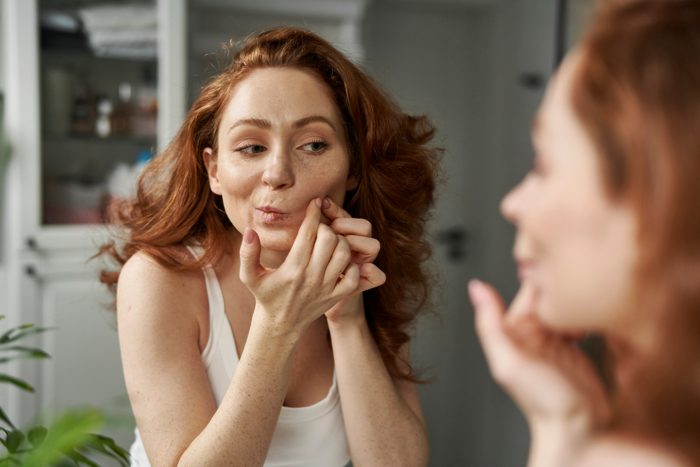
Acne
Strangely, some women find that they are struggling with acne reminiscent of puberty at the same time they’re dealing with wrinkles. It’s normal for hormones to fluctuate during perimenopause and those can cause breakouts, she says. The idea that only teens get acne is a major myth.
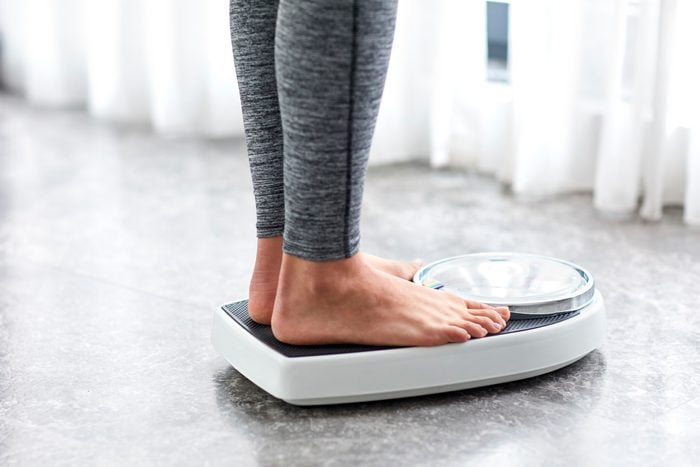
Weight gain
“Weight gain isn’t inevitable during the menopausal transition but metabolism does slow down which can lead to gaining weight, making it more important to be mindful of nutrition and exercise during this time,” says Dr. Hu.
She adds that women are at higher risk for insulin resistance during this period, which can lead to fat stored around the midsection (regardless of your weight) and is the precursor for Type II diabetes.

Bad sex
Pain during sex, vaginal dryness and tearing, and decreased libido are all common signs of menopause. The culprit, again, is dropping hormones (especially testosterone), says Dr. Hu.
The cure? More sex…but with lots of lube. “Having regular penetrative sex can help keep the vagina from atrophying,” she says, adding that it’s important to go slow and use lots of lubricant to protect your tender vaginal skin.

Wonky periods
Your periods during perimenopause may get heavier or lighter, or fluctuate. They will also become irregular, often shortening the cycle. You may have more or different PMS symptoms. “We have many patients who will come in and say, ‘I feel like I’m on my period all the time! So that can’t be menopause right?’,” says Dr. Hu. “It may feel counterintuitive, but any changes to your menstrual cycle at this age are an indication that menopause is on the horizon.”
Upside: Women who have large or painful uterine fibroids often find that they diminish or disappear after menopause!
7 Sustainable Period Products Totally Worth Trying, from Women’s Health Specialists

Brittle bones
Osteoporosis, or bone loss, is a well-known side effect of decreasing estrogen. Yet, Dr. Hu says, many women still don’t know how vulnerable their bones become during this transition.
Increase your calcium intake, do regular weight-bearing exercise, and get regular scans to monitor your bone health.
The 4 Best Exercises to Strengthen Bones in Your Upper Body, From an Exercise Physiologist
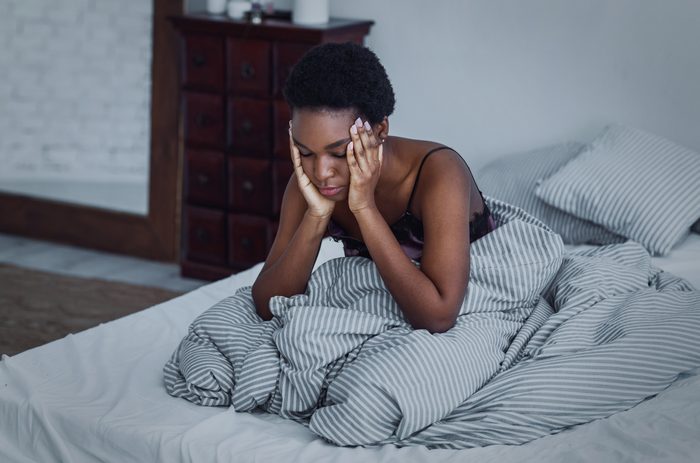
Insomnia
Perhaps one of the most frustrating signs of menopause is the inability to get a good night’s sleep. If it isn’t anxiety keeping you awake, it’s hot flashes waking you up. A study published in Nature and Science of Sleep found that the majority of women reported sleep problems during this transition phase, and one in three women said it was so severe that it affected their ability to function in the daytime.
Can’t Sleep? A New Study Found This Solution Was More Powerful Than Melatonin

When to ask for help
“If I have one message that I really want to get out to women, it’s that you should be talking about perimenopause and menopause with your doctor early and often,” Dr. Hu says. “You don’t have to wait until you’re super depressed or feeling like death! We have lots of ways to help manage symptoms, including hormone therapy, medications, and lifestyle changes. This can be a time of growth and excitement in your life, not just something to be suffered through.”
Not sure how to bring it up? Use these tips for communicating with your doctor.
